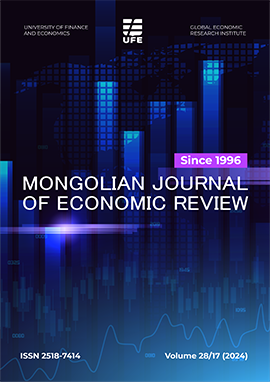Poly-perma crisis of the world economy, new approaches and paradigms in economic thoughts
DOI:
https://doi.org/10.69588/mjer.v28i17.3481Keywords:
Economic democracy, polycrisis, innovative economic tendenciesAbstract
Scientists and researchers have called the global economic crisis as the lost decade and the period of polyperma crisis.
Along with the progress of human society, it has started to move to a new way of life to deal with polyperma (multilateral and permanent) crisis. Today's global civilization and economy have not managed to prevent changes in nature, environment and climate, and have not been able to avoid destructive threats, and relations between countries have not been able to get rid of the most barbaric forms and wars. On the contrary, it is expected that adaptation and adaptation to them will be put forward as a strategic goal. At the same time, the final results of human social economic activities are accelerating, and in some conditions, they are turning into even more harmful activities. These situations indicate the need to develop and introduce innovative economic thinking and paradigms.
Дэлхийн эдийн засгийн полиперма хямрал, эдийн засгийн сэтгэлгээний шинэ хандлага, парадигмууд
Дэлхий нийтийг хамарсан эдийн засгийн хямралт байдлыг эрдэмтэд, судлаачид алдагдсан арван жил, полиперма хямралын үе гэж нэрлэх боллоо.
Хүн-Нийгэм хөгжил дэвшлийн зэрэгцээгээр полиперма (олон талт ба байнгын) хямралтай тэмцэх амьдралын шинэ хэлбэр рүү шилжиж эхэллээ. Өнөөгийн дэлхийн соёл иргэншил эдийн засаг нь:
- Байгаль дэлхий, хүрээлэн буй орчин, цаг уурын өөрчлөлтүүдийг урьдчилан сэргийлж, хөнөөлт аюул уршгаас зайлсхийж амжсангүй (HIV, SARS, MERS, EBOLA, гахай, шувууны ханиад гэх мэт),
- Улс гүрнүүдийн хоорондох харилцаа хамгийн зэрлэг хэлбэр, дайн байлдаанаас ч ангижирч чадсангүй,
- Харин ч тэдгээртэй дасах, зохицох үйл ажиллагааг стратегийн зорилго болгон дэвшүүлэх төлөвтэй,
- Мөн хүн нийгмийн эдийн засгийн үйл ажиллагааны эцсийн үр дүн буурах хандлага түргэсэхийн зэрэгцээгээр, зарим нөхцөлд, бүр ч хор хөнөөлтэй үйл ажиллагаа болон хувирах шинжтэй болжээ,
- Эдгээр байдал эдийн засгийн шинэлэг сэтгэлгээ, парадигмыг боловсруулах, нэвтрүүлэх шаардлагатай тулгарсныг илэрхийлнэ.
Түлхүүр үг:
Эдийн засгийн ардчилал, поликризис, эдийн засгийн шинэлэг сэтгэлгээ
Downloads
299
References
Burlingame, R. (1954). Henry Ford: A Great Life in Brief. New York: Knopf.
Mill, J. S. (1836). On the definition of Political Economy and on the method of investigation proper to it.
OpenAI-AI research and deployment company . (2015-2023). OpenAI. OpenAI: https://openai.com/product/gpt-4-ээс Гаргасан
Ryan Brukardt, J. K. (2023). Space: The missing element of your strategy. McKinsey & Company.
Skousen, M. (2001). The Making of Modern Economics: The Lives and Ideas of the Great Thinkers . New York: M.E. Sharpe Inc.
Smith, A. (1776). The Wealth of the Nation. Nepko publishig.
York, E. (2020). Summary of the Latest Federal Income Tax Data. Washington DC: Tax Foundation.
Карелов, С. (2022). AICG technology.
OpenAI-AI research and deployment company . (2015-2023). OpenAI. Retrieved from OpenAI: https://openai.com/product/gpt-4
Downloads
Published
How to Cite
Issue
Section
License
Copyright (c) 2024 Rinchennyam Amarjargal, Tsedevsuren Davaadorj

This work is licensed under a Creative Commons Attribution-NonCommercial-NoDerivatives 4.0 International License.
Copyright on any research article in the Mongolian Geoscientist is retained by the author(s).
The authors grant the Mongolian Journal of Economic Review a license to publish the article and identify itself as the original publisher.

Articles in the Mongolian Journal of Economic Review are Open Access articles published under a Creative Commons ATTRIBUTION-NONCOMMERCIAL-NODERIVS 4.0 INTERNATIONAL - CC BY-NC-ND 4.0.
This license permits use, distribution and reproduction in any medium, provided the original work is properly cited.




